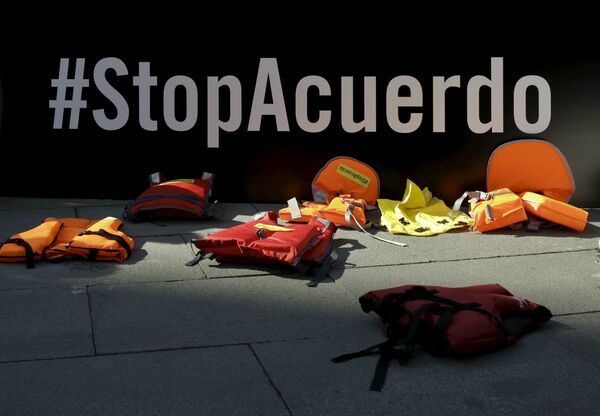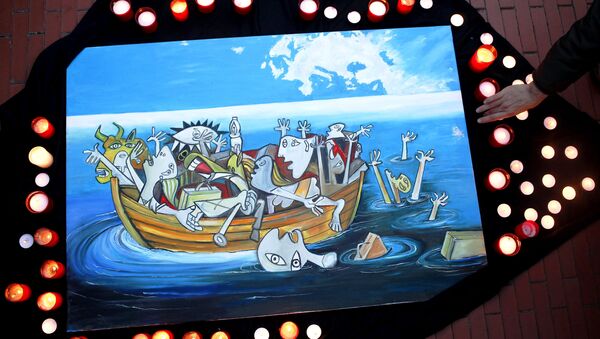EU leaders have failed to pull together a common policy on immigration ever since the escalation of the crisis in 2015. Before then — even — thousands of migrants had been crossing the Mediterranean to find refuge in Italy and Greece, which had borne the initial brunt of the diaspora from warzones in Afghanistan, Iraq, Syria and other countries during 2013 and 2014.
A summit of EU leaders on March 7 was supposed to have reached an agreement for the EU member states to pay Turkey US$3.35 billion and another tranche of cash to help it cope with the refugees within its own borders which it would control to stem the flow of migrants into Europe.
I look forward to the discussion with #Turkey Prime Minister @Ahmet_Davutoglu on EU-Turkey relations pic.twitter.com/2fj4AzaHBw
— EP President (@EP_President) 7 March 2016
Instead, German Chancellor Angela Merkel attempted to broker a deal with Turkish Prime Minister Ahmet Davutoglu that Turkey would receive more than US$6 billion and would accept the return from Greece of "irregular migrants" and asylum seekers whose claims have been declared inadmissible or rejected. For each returned migrant, EU member states would accept one Syrian refugee from Turkey in a one-for-one deal.
The "one-out-one-in" deal shows the #EU's inability to treat #refugees as #people rather than numbers @INTHENOWRT pic.twitter.com/YRH6ixTpOX
— MSF Sea (@MSF_Sea) 9 March 2016
Davutoglu held out for more and demanded that — as part of the deal — the EU would grant visa-free access for 75 million Turkish citizens from June 2016 and speed up the country's accession into the EU.
Members of the European Parliament Foreign Affairs Committee said: "Outsourcing the refugee crisis to Turkey is not a credible long-term solution to the problem." They also said that any deal over refugees should not be coupled to Turkish accession into the EU.
Support for Merkel Falling Like Dominos
Merkel's one-for-one plan relies on individual EU members agreeing to take in Syrian refugees — a matter which has so far deeply divided them. A plan to relocate 160,000 refugees from Greece and Italy — agreed in September 2015 after months of disagreement — has, by March 15, 2016 only moved 937. Only 15 Member States have offered places to Greece for relocations.
We need 6000 relocations by 16 April, and at least 20,000 by 16 May + 18000 left to resettle as a first step https://t.co/XzvckPVzPc
— DimitrisAvramopoulos (@Avramopoulos) 16 March 2016
Austria is against the idea because it already has a significant minority of Turks in its population and it fears those fleeing persecution in Turkey may flood the country under the visa-free part of the deal. Hungarian Prime Minister Viktor Orban who spearheads the Visegrad group (Czech Republic, Hungary, Poland and Slovakia) has repeatedly said he would not accept a redistribution of migrants from Turkey to Europe.
Cyprus is set to torpedo the Merkel-Davutoglu deal on the grounds it is seeking reunification of the island, which is part occupied by Tukey, and wants to follow a UN-led agenda and not one brokered to save the refugee crisis.
Bulgarian sources say they will veto the deal if there are no safeguards against the migrant route re-routing from Turkey across the Black Sea. French President Francois Hollande has expressed reservations about Turkey's human rights record and clampdown on the media.
There are demonstrations in Spain Thursday against the deal, where Socialist leader Pedro Sánchez said the proposal was "unfair… and not compatible" with European values.

Border Closures
The issue has been exacerbated by many member states unilaterally closing their borders, throwing the Schengen zone into turmoil and causing arguments between neighboring nations. A group of 21 charities Thursday sent a letter to EU leaders calling for a humanitarian solution to the crisis.
"Border closures, coupled with a stark lack of legal routes, are not the answer to managing the arrival of refugees and migrants in Europe. People, not borders, are in urgent need of protection," they wrote.
German migration expert Klaus Bade, writing in MiGAZIN, the online migration portal, said the Merkel-Davutoglu deal amounted to:
"…the semantic conversion of people seeking protection into 'illegal migrants' is, however, the scandalous high point of the war against refugees and a sad further example of the short step from taboo words to malpractices."
With such deep divisions in Europe and a complete failure to come up with a plausible pan-European policy on immigration going back over a year, the EU-Turkey deal is likely to be the latest flop as deep divisions grow within Europe and the EU dream turns into a nightmare.






